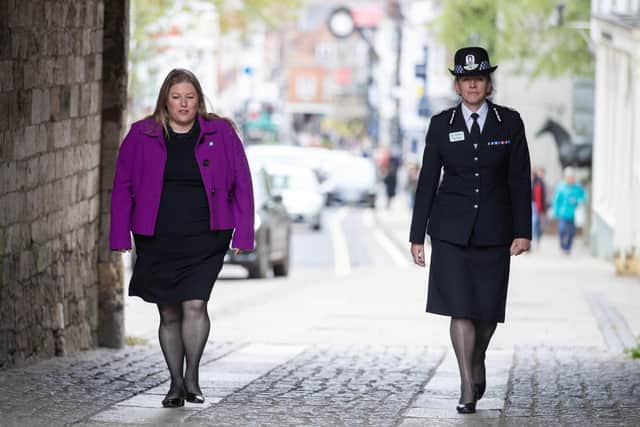Hampshire crime commissioner Donna Jones launches review into secret - or anonymous - police disciplinary hearings
and live on Freeview channel 276
Donna Jones says she is looking again at the process which has seen some officers given anonymity by a hearing despite being sacked over serious disciplinary matters. Some hearings are entirely heard in secret.
One was a case heard in October of a Portsmouth officer who was found to have pursued a relationship with a domestic abuse victim.
Advertisement
Hide AdAdvertisement
Hide AdThe nine-day hearing was told that the officer, who was trained to deal with domestic violence, kissed the woman and hugged her – and invited her to his flat to ask her out for cocktails. He bombarded her with WhatsApp messages and calls while off duty and from his personal phone.


Even though he was sacked for gross misconduct, his identity was not released by the hearing, despite submissions at the time from The News and other media, although the hearing was reportable. At the time domestic abuse charities warned that lives could be at risk if his actions deterred women from reporting violence – and asked why his name was not released to make sure no other women had gone through the same experience with him.
But today he can be identified as PC Simon Bailey, as his name has been published on the College of Policing’s barred list.
This gives details of officers who have been dismissed from policing after an investigation. It was introduced ‘as part of the government's commitment to improving police integrity’.
Advertisement
Hide AdAdvertisement
Hide AdAnother recent high-profile case saw former Basingstoke PC Terry Cooke sacked, again for abusing his position to pursue relationships with vulnerable women he met through his job, including domestic abuse victims.
During a case fought and won by local media publisher Newsquest to name Cooke, High Court judge Justice Naomi Ellenbogen said: ‘Open justice is a fundamental principle of the common law. Its justification is the ‘value of public scrutiny as the guarantor of the quality of justice.
‘Its significance has, if anything, increased in an age which attached growing importance to the public accountability of public officers and institutions and to the availability of information about the performance of their functions.
‘Anonymised reporting of issues of legitimate public concern are less likely to interest the public and therefore, to provoke discussion. In relation to the acts of serious misconduct committed in the context of his professional activities, I find that Mr Cooke has no reasonable expectation of privacy.’
Advertisement
Hide AdAdvertisement
Hide AdDespite the fact that Hampshire police has repeatedly said there should be a ‘presumption of transparency’, around a third of all police misconduct hearings in Hampshire where sanctions have been issued have been heard behind closed doors.
Misconduct hearings are presided over by a legally qualified chair (LQC), who is appointed by the police and crime commissioner.
Mrs Jones says that she stands firmly behind the idea that misconduct hearings should in most cases be held in public – but is carrying out an internal review of the process ‘in relation to holding hearings in exempt session and releasing the identity of the officer, if found guilty’.
Advertisement
Hide AdAdvertisement
Hide AdShe said: ‘The starting point should be that hearings are held in public and the identity of those found guilty of misconduct, published.
‘Whilst I accept there are circumstances when this is not appropriate, for example, a related ongoing enquiry, the withholding of an individual’s identity should only be in exceptional circumstances.
‘Publication acts as a deterrent and helps increase public confidence in the complaints and misconduct process.
‘The public has a right to know about the conduct of officers and the media play an important part in reporting trials involving police officer. I support the changes to the complaints process in 2020, which outlines the media are to be consulted if reporting restrictions are proposed. This is designed to help ensure openness and transparency to the public.
Advertisement
Hide AdAdvertisement
Hide Ad‘As police and crime commissioner, the conduct of officers is something I take seriously. By challenging Hampshire Constabulary to uphold the highest standards and supporting the force as it proactively tackles serious misconduct, I aim to ensure we have a police force fit for purpose across all our communities.’
Referring to the Bailey case, a Hampshire police spokesman said the force followed the rules correctly.
He said: ‘During the hearing, the independently appointed legally qualified chair put in place a reporting restriction which granted lifelong anonymity to the officer.
‘The hearing was held under the 2020 misconduct regulations. Hampshire Constabulary fully supports the misconduct regulations and the presumption hearings should be held in public. However, officers are able to make formal representations for reporting restrictions to be applied, and these are assessed by the chair, who determined in this instance that his submissions outweighed the public interest, and the reporting restriction should be put in place. Representations were made from media organisations.
Advertisement
Hide AdAdvertisement
Hide Ad‘The regulations governing misconduct hearings are laid out by the Home Office and followed by all police forces. The barred list is managed by the College of Policing.’
If an anonymity order is placed on a misconduct hearing the Home Office guidance is that the Independent Office for Police Conduct should be consulted. An IOPC spokesman confirmed that in the Bailey case it had been contacted and that it had not raised objections to the reasons for the order, which were said to be based on medical evidence ‘to protect [the officer’s] welfare.’
